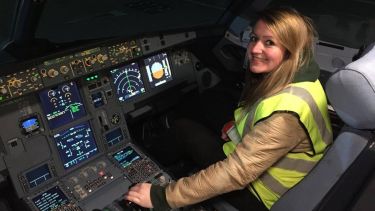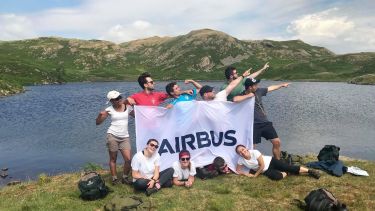I wanted a course that I could tailor to what I liked and that’s exactly what I got

Read: Our interview with Josie
Why did you want to be an engineer?
Around the age of seven, I was lucky enough to have a relative who owned a light aircraft and I used to go flying regularly. I fell in love with the whole thing from flying, to the aircraft, to airshows, all of it!
As I got older, I joined the RAF section of my school’s CCF (Combined Cadet Force) which gave me the opportunity to fly motor gliders on weekends. I also gained a Gliding Scholarship which eventually led to a volunteer role at the VGS (Volunteer Gliding Squadron) on a local RAF base. The obvious career choice would have been to become a pilot, but with the automation involved in commercial aircraft these days, it was more appealing to me as a hobby than a career; so engineering was the next obvious choice!
Why did you choose to study at the University of Sheffield?
Sheffield, to this day, is my favourite city. If Airbus suddenly decided to open an office in Sheffield, I would move in an instant! I don’t really know how to describe why, but everyone I know who has lived there has a special place in their heart for it! It’s not too big and not too small; the people are friendly; the beer is cheap(!); the Peak District is minutes away - it’s just great.
With regards to the University, I liked that it’s part of the city rather than being a self-contained campus. It was high in the league tables; a traditional red-brick University and had an award winning Student’s Union. I wanted a course that I could tailor to what I liked and that’s exactly what I got. The first few years offer variety and insight into a wide range of topics, the last few years are more focused on a discipline of your choice - it’s your degree!
What is your role at Airbus?
I am currently a Lead Design Engineer in the In-Service Daily Repairs team. Airbus aircraft come with an SRM (Structural Repair Manual) that defines certain types (e.g. corrosion, lightning strike, dents) and sizes of damage that are deemed acceptable and can be repaired by the airline/maintenance organisation based on the instructions in the manual. If the damage is found to be out of those limits, they come to us for repair instructions.
My job is to design and sign-off on repair designs when the damage falls out of allowable limits. I work closely with stress and fatigue engineers as well as customer services to ensure jobs are answered in a timely manner and have a team of designers whose repairs I am responsible for signing off.
What’s been the highlight of your engineering journey so far?
The highlight so far has to be having the opportunity to work in New Zealand, with Air New Zealand, for three months as part of my Graduate Scheme. It was an incredible experience from both a personal and professional point of view and an opportunity that I will be forever grateful for!
What are your ambitions for the future?
Honestly, I don’t really know! I would like to stay in a technical role for another few years at least, working towards Chartership during that time. After that, I’d like to move towards a management role still within engineering. At the moment, I don’t see myself leaving Airbus any time soon as there are so many roles, career paths and opportunities available all under “one roof”, but we will see where the world takes me!
Research has shown that to encourage women to think about a career in engineering we must start teaching what engineering is at a young age. How would you encourage primary school children to become interested in STEM?
I think engagement with local engineering companies is really important. During my Graduate Scheme, I regularly went into schools (including primary) and ran workshops with the children, and the feedback was always really positive. Also, especially at young ages, it’s important to make it fun – for example, playing board games that involve maths or building something out of Lego.
What’s the best thing about being an engineer?
The reaction you get when you tell someone you’re an aerospace engineer! But seriously, the feeling at the end of each day that you’ve made a difference. In my case, every day I know that a repair that I’ve signed off has potentially prevented a flight from being cancelled and I’ve contributed to someone getting to where they want or need to go. In a more general sense, engineering has so much potential to shape the future and it’s a great thing to be a part of.
We interviewed Josie in April 2021.

International undergraduate scholarships
We are offering scholarships of £2,500 for each year (subject to a 60% average) of your undergraduate degree. The maximum value is £10,000 for four-year programmes.


